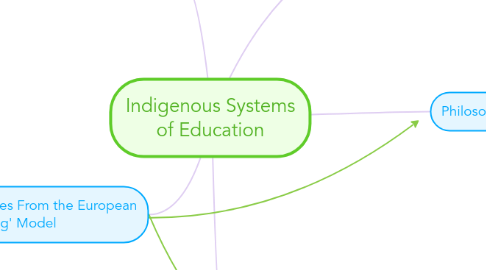
1. Similarities With the European 'Schooling' Model
1.1. Educational Technology
1.1.1. Can Educational Technology be integrated into indigenous educational systems in a manner that is not culturally detrimental?
1.2. Teacher/Elder with students
1.2.1. How can community 'elders' be brought back onto the educational mold as educators who are respected for their traditional knowledge?
1.3. Handing knowledge down from one generation to the next
1.3.1. Can traditional indigenous knowledge systems be integrated with the 'schooling' model? How? Examples?
1.4. Child/Student centered learning?
2. Differences From the European 'Schooling' Model
2.1. Nature over money
2.1.1. Why have traditional education systems been so successful in ensuring cultural survival while our modern systems are leading us in the opposite direction?
2.2. Traditional knowledge respected rather than marginalized
2.2.1. Why do modern education systems view older forms of education as obsolete?
2.3. No walls
2.3.1. Can education exist without the bricks and mortar of school buildings?
2.4. Hands-on learning
2.4.1. Can education be purely hands-on as opposed to the abstract learning characterized in the European model
3. Impediments to Implementaion
3.1. Governments
3.1.1. Majority World
3.1.1.1. There is a mentality that the Western systems are the best.
3.1.1.1.1. Most elites educated in Western systems and run their countries in contradiction to their culture.
3.1.2. Minority World
3.1.2.1. A lot of money and jobs are predicated on exporting education philosophies, ideologies and professionals to the Minority World.
3.2. Global corporations
3.2.1. They need workers that are trained to be part of their systems.
3.2.1.1. This also extends to 'critical thinkers' who are required for corporations to get leverage on their competition.
3.3. Colonized mindsets
3.3.1. Capitalist comforts
3.3.1.1. Are the benefits of living in a materialistic society too enticing to bring people back to their traditional ideologies?
3.3.2. TINA (There Is No Alternative)
3.3.2.1. Can people imagine a different way of educating their children other than with a teacher, subjects, bell, school, etc.?
4. Historical Foundations
4.1. Religious
4.1.1. What religious values allowed these systems to thrive and be benificial?
4.2. Cultural
4.2.1. Are there cultural similarities amongst indigenous education systems aronnd the world?
4.3. Environmental
4.3.1. What role did the natural environment play as these systems developed over generations.
5. Philosophies of Sustainability
5.1. Living in harmony with nature
5.1.1. Why was this such a priority in indigenous systems, yet, very mush marginalized in the Western model.
5.2. Social cohesion
5.2.1. How was this dealt with in indigenous systems?
5.3. Taking care of those less fortunate
5.3.1. How do indigenous systems view the less fortunate?

